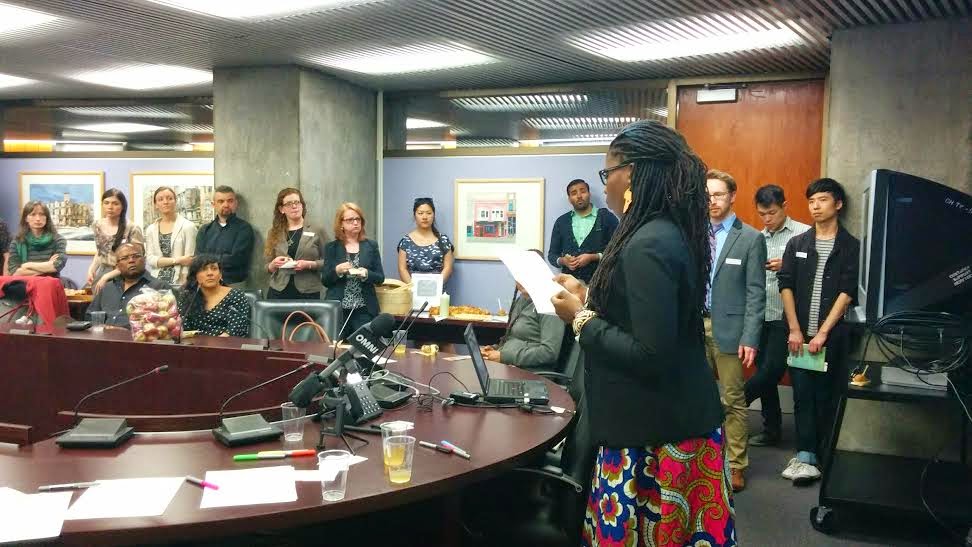Food Justice - News from Toronto's City Hall
Last week, Toronto Mayor John Tory proclaimed May 5, 2015 Food Justice Day in Toronto. For this special occasion, Nydia Dauphin, FoodShare Toronto’s Food Justice Senior Coordinator, was among the guest speakers invited to City Hall to share their work and recommendations to advance food justice in the city. FoodShare is a member of Food Secure Canada.

About FoodShare Toronto’s Food Justice Work
FoodShare Toronto is a non-profit community food organization that develops long-term solutions to address food system inequalities. Our programs follow a food justice community development model to rebuild community control of our food system by partnering with community leaders, organizations, and schools.
FoodShare prioritizes work with low-income communities and schools through focused programs in fresh produce distribution, food literacy education, urban agriculture, nutrition and community cooking. All programs support a variety of health, economic, environmental, community, and social benefits, and seek to improve food access for everyone currently underserved by the food system.
Since first founded in 1985, FoodShare’s visionary leadership has pioneered long-term replicable solutions, and cultivated public empowerment and awareness of food issues. FoodShare believes that high-quality affordable healthy food should be universally available, and advocates for policy change needed to address the root causes of hunger.
The Cross-Cultural Food Access Innovation Hub
Through the Cross-Cultural Food Access Innovation Hub, FoodShare supports local solutions to address systems of oppression and exclusion in the food system. With this work, FoodShare has made it a priority to work with members of the indigenous community (the Three Sisters’ House/Nswo Nshiimenhig Endaayat), the African-Caribbean community (the Black Farmers and Growers Collective) as well as the New Comers community (Thorncliffe Park Women’s Committee), by providing organizational resources to support these community-led groups.
Food Justice Network
FoodShare Toronto animates a Food Justice Network in partnership with Food Secure Canada. Food Secure Canada is a pan-Canadian alliance of organizations and individuals working together to advance food security and food sovereignty through three inter-locking goals: zero hunger, healthy and safe food, and sustainable food systems. The aim of this network is to elevate food justice understanding and application across the country.
Growing Food and Justice for All - Toronto Local Empowerment Group
At the local level, FoodShare coordinates the Toronto chapter of the North American Growing Food and Justice for all initiative, which works to dismantle racism and empower low-income and communities of color through sustainable and local agriculture. From May 22-24, we will be hosting for the second time in Toronto a Growing Food Justice by Uprooting Racism Training with facilitators from Growing Power. This training aims to push forward the integration of racial justice principles into the food justice movement, to give hands on tools, to continue a strategic dialogue and to enable an exchange between activists who work in this field.
Recommendations
The following recommendations were put forth:
1. a City wide adoption of the notion of racialized food insecurity. A Racialized group is a group categorized or differentiated on the basis of membership in a racial group. This process becomes the basis through which groups are subjected to differential treatments. This is fairly known when we are talking about poverty, un/underemployment or incarceration, with statistics attesting to the overrepresentation of people of colour and indigenous communities in these instances. But food access is no different. In 2012, PROOF who conducts research to identify policy options to reduce food insecurity, released their Report on Household Food Insecurity. The report revealed that 28.2% of surveyed indigenous households in Canada were food insecure, 27.8% for Black households respondents, and 19.8% for recent immigrants to Canada (less than 5 years) compared to a Canadian average of 12.6%.
Recognizing that food insecurity is also racialized would lead to a promotion of community-specific initiatives and move away from colour-blind approaches that leave so many of these communities' needs unmet. Adopting this notion would ensure that city planning policies were informed by that lens and propose solutions that lead to structural change, directly challenging systemic racism in the City.
For example, the Urban Heart Indicator that was used last year to determine the new Neighborhood Improvement Areas in Toronto limited its analysis of food security to the presence of healthy food stores. A more thorough analysis informed with the notion of racialized food insecurity at its core would have looked at ethnic composition of each neighborhood in conjunction with the cultural appropriateness of food, its affordability and income levels to name a few. This in turn would lead to the adoption of solutions at the city level that challenge the root causes of these inequities which are systemic in nature.
2. Increase the availability of trainings for social services and health care professional staff around food justice and inequalities. As first responders directly in contact with food insecure communities, these practitioners must be equipped with the tools to understand how structural racism operates and how this affects the dynamic of their work in these communities. The training we are hosting next week is but one example of the initiatives that should be more readily available across the city and that have the potential to truly change the narrative of food insecurity.
3. Increased city dedicated resources and staff (food justice/equity animators) to work with communities most impacted by food injustice to ensure that their voices are heard and are central to the solution process. From our experience, we see an increased difficulty of getting funding for community-led groups already doing a lot of the frontline food justice work, and more often than not as volunteers. Appropriate support must be given so that they are in a position to lead the charge.
When funds are made available, a common way for these unincorporated grassroots initiatives to receive them is to enter into a trustee relationship with a larger organization. But these relationships can put the grassroot organization in a vulnerable position, as paternalistic dynamics can easily arise, leaving the grassroots far from an empowering experience. Additionally, the paperwork and bureaucratic obligations when funds are made available can be so heavy that they take precious time away from the organization’s much needed groundwork. A funding stream at the city level more adapted to the structural nature of these grassroots would increase the impact of the City’s support.
- Blog de Nydia
- Identifiez-vous pour poster des commentaires

